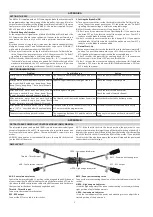
YOUR SPEEDSTER 2
RISERS
EN
05
04
Replacing the iconic Speedster was never going to be easy, the all new design retains a similar
character to its predecessor but includes technological improvements to further improve the
handling, stability and efficiency.
The Speedster 2 features a faster top speed than its predecessor, the reduced line drag and
optimised profile have made this new wing an incredible tool in accelerated flight. In addition
to the increased speed, the Speedster 2 is more efficient, requiring less fuel and less power
to maintain top speed.
The OZRP shark nose reflex profile, along with the modified aspect ratio and optimized internal
structure, has sharpened the handling, increased the inherent stability, and improved the sail
cohesion – all of which means that the wing is easier and more forgiving to fly, especially in
turbulent air. The fact that the aspect ratio has been reduced alongside an increase in overall
performance means that the Speedster 2 is a huge step forward from the original Speedster.
The Speedster 2’s handling is great fun; it is precise, intuitive, and extremely resistant to
spin when being flown in deep brakes. On the ground, the inflation characteristics have been
improved - the Speedster 2 comes up quickly and evenly, especially in nil or light winds.
The Speedster 2 comes with a completely new riser system, which includes the innovative 2D
TST device for improved precision in accelerated flight, multiple brake pulley positions, and
extended trimmer range.
Certified DGAC, EN C*and load tested to 243kgs (5.25g), the Speedster 2 is available in 4
sizes 22**, 24, 26 and 28 to cover a wide range of pilot weight and power unit combinations.
4 standard colour schemes and custom colours.
*Trim speed only, trimmers set to the slow position.
**DGAC certification only
The updated risers feature long range trimmers; stronger brake handle magnets; TST and
innovative 2D steering systems; fully adjustable brake pulley height settings and coloured A
risers for easy identification. See page 30.
Trimmers
The Speedster is supplied with a trim riser set. The ‘neutral’ or standard position is when the
trimmers are pulled all the way down and it is in this position that the wing is certified. The
trimmers can be set to the white line for better inflation behaviour during take-off. This is
especially useful in light winds and/or at high altitudes. The standard (certified) trim setting
is ideal for climbing under power, whilst thermalling and when the air is turbulent. Brake
pressure is lighter and the handling at its best at the standard (certified) trim setting. To
increase cruise speed you can use the accelerator system, release the trimmers, or do both.
Using the speed system has exactly the same effect as releasing the trimmers so it is safe
and possible to fly with the trimmers in the standard position whilst using the full range of
the speed system.
In turbulent air the reflex profile is very stable. It will resist reasonable levels of turbulence
with a high resistance to collapse without pilot input. The faster the wing is flown the more
inherent stability there is, as the reflex has a greater effect. In mild turbulence it may be best
to not attempt to fly the wing actively and let the profile absorb the turbulence itself, indeed
small applications of the brakes can reduce the inherent stability of the profile. However in
very strong turbulence Ozone recommends to return the trimmers to the neutral position
(pulled down) and flying the glider actively. This way, you will be in the best position to react
correctly should an incident occur.
Accelerator System
The risers feature an accelerator system with ball bearing pulleys for easy, comfortable high
speed cruising. Using the speed system has exactly the same effect as releasing the trimmers.
Either can be used in any combination to accelerate the wing, but be careful, fully accelerated
with trimmers released is very fast and should only be used in calm conditions and sufficient
altitude.
IMPORTANT
In thermic or turbulent
air pull the trimmers
to the slow or neutral
position or at least to
the white stitch line or
accept a higher risk of
collapse.
IMPORTANT
When accelerated
directional control
should be maintained
with the TST system or
the Tube Ball handle
(if the 2D system is
installed). Do NOT use
the brakes.
Summary of Contents for Speedster 2
Page 1: ...Pilots Manual...
Page 2: ......
Page 20: ...1258 Route de Grasse Le Bar sur Loup 06620 France...




































